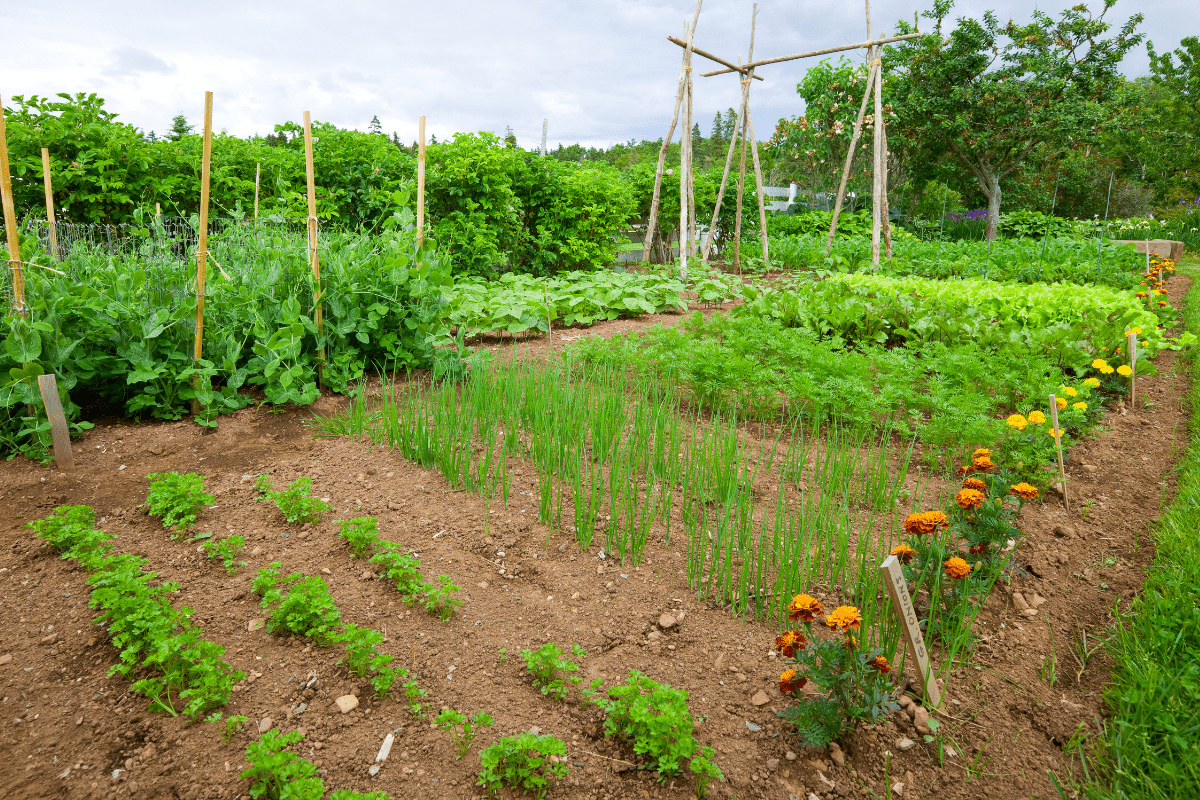Picture this: you're wandering through a Tennessee farmers market on a crisp October morning, overwhelmed by tables piled high with sweet potatoes, winter squash, and the last of the season's tomatoes. If you're like me, you probably grab whatever looks good and hope for the best… only to find that butternut squash still sitting on your counter three weeks later.
Tennessee's agricultural landscape offers incredible variety across its 77,300 farms, but knowing what's in season (and what to do with it) can feel like solving a puzzle. From the mountain valleys of East Tennessee to the rich delta farmland of the West, each region and season brings its own special harvest.
Spring awakens with tender greens and ruby-red strawberries
Spring in Tennessee starts earlier than you might think, especially if you're new to the South. By March, while folks up north are still shoveling snow, West Tennessee gardeners are already planting peas and lettuce.
The season kicks off with those cheerful daffodils and dogwoods that make every Tennessee highway look like a postcard. But the real excitement starts when local strawberries arrive. These aren't your grocery store berries that taste like crunchy water… Tennessee strawberries in May are sweet enough to make you forget ice cream exists.
Finding spring's best produce
The strawberry farms open for u-pick adventures from late April through early June. Wagner Berry Farm in Spring Hill and Buffalo Trail Orchard in East Tennessee are local favorites where kids inevitably eat more than they pick. Pro tip: arrive before 9 AM at farmers markets for the best selection, and don't wash berries until you're ready to eat them. They'll last 3-4 days in the fridge if you resist the urge to rinse them immediately.
Spring vegetables thrive in our mild temperatures:
- Asparagus (emerges mid-March)
- Tender lettuces and spinach
- Radishes and sugar snap peas
- Ramps in East Tennessee mountains
- Early cabbage and broccoli
- Fresh herbs like cilantro
Those famous ramps (wild leeks) are such a big deal in East Tennessee that Polk County throws an entire festival called the Ramp Tramp. If you've never tried them, imagine garlic and onions had a really assertive baby. They're only available for a few weeks, so grab them when you see them.
Timing your spring garden
Here's where regional differences really matter. West Tennessee gardeners can start planting cool-season crops in early March, while folks in the mountains need to wait until late March or even April. The last frost dates vary dramatically: April 9-18 for West Tennessee, April 21 for Middle Tennessee, and anywhere from April 22 to May 26 in the mountains.
Summer brings the mother lode of Tennessee produce
If spring is the warm-up act, summer is the headlining performance. From June through August, Tennessee farms produce enough tomatoes, peaches, and berries to make your kitchen counter look like a produce stand.
Tomatoes deserve their own fan club here. Tennessee ranks among the top four states for fresh tomato production, and once you've tasted a Cherokee Purple or Mortgage Lifter grown in Tennessee soil, you'll understand why. These aren't the pale imposters you find in January… these are the tomatoes that make you want to eat them like apples, with juice running down your chin.
The summer fruit parade
Peach season runs from June through August, with 25 different varieties ripening in sequence. Jones Orchard in Millington grows favorites like Redhaven and Georgia Belle across two West Tennessee locations. Unlike grocery store peaches that never quite ripen properly, these beauties will perfume your entire car on the drive home.
Summer berries deserve equal attention:
- Blueberries (rabbiteye varieties thrive here)
- Blackberries (Caddo for flavor, Natchez for size)
- First figs in late summer
- Wild muscadines in August
Storage tip that took me years to learn: keep berries in the fridge for only 2-3 days, while peaches can last 2-3 weeks at 45°F. And please, for the love of all that's holy, never refrigerate tomatoes unless they're completely ripe. Room temperature, stem-end up, just like your grandmother probably told you.
Flowers that can take the heat
Tennessee summers aren't just about edibles. Native flowers like purple coneflowers, black-eyed Susans, and bee balm turn gardens into pollinator paradise. Bent Tree Spring Farm in Jonesborough offers u-pick flower fields with sunflowers, dahlias, and zinnias… perfect for those Instagram-worthy bouquets that actually last more than two days.
Butterfly weed (that bright orange native) serves as a crucial monarch butterfly host plant. Plant some, and you'll have a front-row seat to the butterfly lifecycle. Just maybe warn your neighbors first, since monarch caterpillars will completely strip the leaves.
Fall's second harvest rivals spring for variety
By September, just when you think you can't look at another tomato, Tennessee surprises you with a completely different harvest. This is apple season, y'all, and East Tennessee's mountain orchards produce fruit that would make Washington state jealous.
The apple harvest spans three full months. Early varieties like Gala arrive in August, while storage champions like Arkansas Black hang on until late October. These mountain apples benefit from cool nights that concentrate sugars and develop color. Store them at 32°F and you'll be making apple crisp at Christmas.
Root vegetables and winter squash
Fall also brings the sweet potatoes that generate serious agricultural revenue for Tennessee farmers. If you've only had sweet potatoes from a can at Thanksgiving, you're missing out. Fresh Tennessee sweet potatoes are naturally sweet enough to eat like baked potatoes, no marshmallows required.
Here's what else peaks in fall:
- Winter squash varieties galore
- Brussels sprouts (actually good)
- Collards and kale (frost-sweetened)
- Late peppers and green tomatoes
- Persimmons after first frost
- Decorative gourds and pumpkins
- Fall raspberry crop
Storage becomes crucial now. Sweet potatoes need curing at 80-85°F for 4-7 days, then store at 55-60°F where they'll last 4-7 months. Winter squash likes the same conditions. That butternut squash on your counter? It's perfectly happy there until April if you don't cut it.
Extending the flower season
Fall flowers deserve more credit than they get. Native asters, goldenrod, and Joe Pye weed bloom just when migrating monarchs need fuel for their journey to Mexico. Chrysanthemums might be basic, but they're basic for a reason… they look fantastic and last forever.
Winter doesn't mean the end of fresh produce
December through February challenges Tennessee growers, but it doesn't stop them. This is when you discover that collards and kale actually taste better after a freeze. The cold converts starches to sugars, making these nutrient powerhouses surprisingly sweet.
Charlie Roberts, a fourth-generation farmer in Halls, improved his winter growing through soil health. His quote about cover crops stuck with me: "Before we were cutting 60-bushel soybeans on one field… Today, that same field may yield 50 or more bushels every year." That's sustainable farming that actually sustains.
What's actually fresh in winter
Winter offerings might surprise you:
- Greenhouse lettuce and herbs
- Storage crops from fall
- Fresh greens (cold-hardy varieties)
- Preserved and fermented foods
- Indoor microgreens
- Root vegetables from storage
- Fresh eggs year-round
Don't overlook winter flowers either. Camellias and hellebores bloom through the cold, while witch hazel produces fragrant yellow flowers even in freezing temperatures. Indoor forcing of paperwhite bulbs brings spring fragrances to January kitchens.
Regional differences shape what grows where
Tennessee's three regions might as well be three different states when it comes to growing conditions. Understanding these differences helps explain why your Memphis friend is swimming in tomatoes while you're still waiting for yours to ripen in Johnson City.
West Tennessee's agricultural powerhouse
With 244 frost-free days, Memphis enjoys the longest growing season in the state. The Mississippi River's influence moderates temperatures, while those famous loess soils (30-90 feet deep!) create some of Tennessee's most productive farmland. This region generates over $1 billion in soybean revenue alone.
Middle Tennessee's diverse landscape
Nashville's 220-day growing season supports everything from CSA farms to the nursery industry. McMinnville actually calls itself the "Nursery Capital of the World," which sounds like marketing hyperbole until you realize how many plants in your local garden center started there. The limestone-based soils provide excellent drainage, perfect for crops that hate wet feet.
East Tennessee's mountain advantages
The mountains create microclimates that allow for sequential harvests. Strawberries might be finishing in the valleys while mountain farms are just getting started. With growing seasons ranging from 215 days in valleys to just 132 days on mountain peaks, farmers here have learned to work with, not against, their elevation.
Where to find Tennessee's seasonal bounty
Knowing what's in season only helps if you know where to find it. Tennessee offers 127 farmers markets statewide, plus numerous u-pick operations and CSA programs.
Nashville's historic market has operated since 1801 (yes, really), with daily indoor vendors and weekend farm sheds. Memphis Farmers Market focuses on education about local eating, while Knoxville's Market Square maintains a producer-only policy that ensures you're buying directly from farmers.
Finding farms and markets near you
The most comprehensive resource is Pick Tennessee Products, which lets you search by location and product. Want strawberries within 20 miles? They've got you covered. Looking for a CSA that delivers to your neighborhood? Also there.
Popular u-pick destinations include:
- Lucky Ladd Farms (strawberries plus agritourism)
- Little Star Farm (flowers and lavender)
- Various orchards for apples and peaches
- Berry farms throughout the state
- Pumpkin patches in October
- Christmas tree farms in December
Joining a CSA program
Community Supported Agriculture offers weekly boxes of whatever's in season. Programs like Caney Fork Farms even offer sliding-scale pricing ($30-$50 per delivery) to increase accessibility. You'll eat vegetables you can't pronounce and discover that kohlrabi is actually delicious when you know what to do with it.
Making the most of your seasonal haul
Here's where many of us fail: we buy beautiful produce, then watch it slowly die in our crisper drawer. Let's fix that.
Never refrigerate these items (seriously):
- Tomatoes (unless fully ripe)
- Winter squash and pumpkins
- Sweet potatoes
- Onions and garlic
- Potatoes
Always refrigerate immediately:
- Berries (all types)
- Leafy greens
- Broccoli and cauliflower
- Fresh herbs (except basil)
- Cut vegetables
The UT Extension recommends separating ethylene producers (apples, tomatoes) from sensitive crops (leafy greens, broccoli). That's why your lettuce turns to slime when stored next to apples… science!
Preserving the harvest
When you inevitably buy 20 pounds of tomatoes because they looked so good, preservation becomes essential. Traditional Tennessee methods include chow chow (a pickled relish that uses up end-of-season vegetables) and pickled okra. Modern techniques like fermentation are having a moment too.
County Extension offices offer preservation classes covering:
- Water bath canning
- Pressure canning
- Proper freezing techniques
- Dehydration methods
- Fermentation basics
Your seasonal action plan
Tennessee's agricultural diversity means there's always something fresh and local available. Start by visiting your nearest farmers market this weekend. Talk to farmers (they love sharing knowledge), try something new, and don't be afraid to ask how to prepare unfamiliar vegetables.
Subscribe to a CSA if you want to be forced out of your comfort zone in the best way possible. Join the Pick Tennessee Products mailing list for seasonal updates. Plant something yourself, even if it's just herbs in a windowsill pot.
Most importantly, enjoy the process. Yes, you'll occasionally buy too much and yes, something will go bad before you use it. But you'll also discover that Tennessee tomatoes in July taste like sunshine, that October apples from mountain orchards ruin you for supermarket fruit, and that knowing your farmer makes every meal taste better.
Welcome to eating seasonally in Tennessee. Your taste buds (and local farmers) will thank you.





